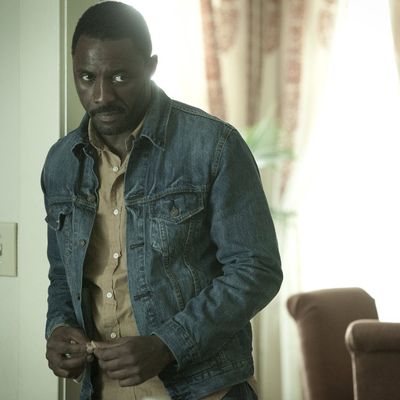
Allow me, briefly, to engage in some critical inside baseball. Two days ago, reviewers across the country received an email saying that the press screening of the home-invasion thriller No Good Deed had been canceled because the studio was concerned that a big twist in the film would be revealed. Since plenty of films with big twists have successfully screened to critics without being ruined, this seemed, to many of us, like nonsense — a lame excuse to keep press from seeing what was probably a terrible film. So, as I and many other critics trudged our way to midnight screenings of No Good Deed last night, there were two questions on our minds: (1) How bad is it? and (2) What’s the twist?
Don’t worry, I won’t tell you what the twist is, other than to say that it’s not particularly noteworthy and actually has precious little to do with the plot. As for the film: Well, it’s certainly not good. But it’s not entirely dire. It stars Idris Elba (The Wire, Mandela, Pacific Rim) as Colin Evans, a suspected serial killer who was imprisoned for the lesser charge of voluntary manslaughter (he accidentally killed a guy in a bar fight). We open on Colin’s parole hearing, where he tries to claim that he’s been rehabilitated and feels deep shame at the fact that he took another man’s life: “I’ve been in the correctional system for five years, and that is exactly what I am — corrected,” he tells them.
Alas, there are plenty of people convinced that Colin did in fact abduct and kill those young women, so his parole is denied. But on the way back to the prison, he manages to grab ahold of his guards and escapes. After briefly dispensing with his ex-girlfriend (“I just want you to forgive me,” he says, right before strangling her and then bashing her head in with a lamp), he winds up, one cold and stormy night, at the home of Terri (Taraji P. Henson), an overworked mother of two whose somewhat distracted husband is away on a golf trip. Pretending to have car trouble and asking for a phone, Colin manages to gain Terri’s trust and works his way into the house.
Elba and Henson are both wonderful actors, and they do what they can with what little psychological back and forth they’ve been provided. He has remarkably kind eyes, which make you want to believe him even when you know the worst is true, but the way he casually dominates the spaces of Terri’s McMansion also speaks to a slowly gathering, alpha-male menace. Even so, both actors are being curiously wasted. I don’t know anything about this film’s history, and yet I couldn’t help but wonder if at some point during production, Colin’s guilt was left uncertain: Why give us a parole hearing otherwise? Why assert that he was never convicted of the murders otherwise? Why go to the trouble of showing him having an actual car accident otherwise? Why cast Idris Elba in the part otherwise? Why even bother having the movie otherwise?
But by making it clear very early on that Colin is a ruthless murderer, the film shoots itself in the foot: It makes Henson’s character look like a trusting fool. The alternative would have been more interesting, more alive with possibility. What if the film kept us guessing as to Colin’s true motives and his guilt, even as we ourselves were pulled towards him — mirroring Terri’s own attraction to him? What if it bothered to actually make us wonder what was going to happen next instead of telegraphing everything? I realize that I’m doing that thing one should never do: imagining a different movie instead of the one before us. But I wouldn’t be surprised if that imaginary movie didn’t exist at some point, instead of the sadistic mess that is No Good Deed.


